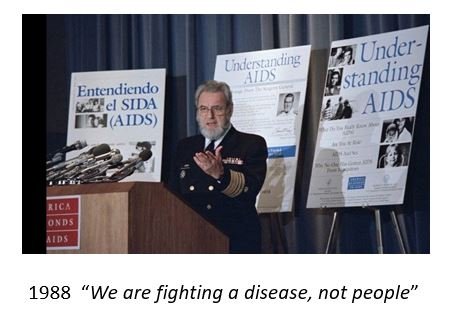How heroes emerge in a pandemic
The cohesiveness of the LGBT community and the leaders who emerged created the change needed to make progress against HIV/AIDS. Credit: Provided by Dr. Bill Valenti
As COVID enters its third year, I’m thinking how this is the third pandemic I’ve lived through.
The first was polio. My sister and I participated in the original Salk vaccine trial.
The second was HIV.
Now we have COVID.
All of this makes me think about what makes leadership, leaders and heroes.
Gen. Patton said “Lead, follow or get out the way.”
Carly Fiorina, former CEO of Hewlett-Packard, said leaders challenge the status quo, they make change and get results. And they may make enemies in the process.
John Gardner, secretary of Health, Education and Welfare under President Lyndon Johnson, founded Common Cause and was an advocate for citizen involvement. Gardner said leaders heighten motivation and confidence and strengthen shared values. When those qualities aren’t there, leaders have a hard time leading.
HIV mobilized people and led to grassroots health advocacy. I’m recalling some of the leaders of that time.
One is Dr. Tony Fauci. He appeared on the scene around 1987 to lead the National Institutes of Health. He was putting together the AIDS clinical trials group to answer the advocates call for research on better research and treatment.
There was a protest in front of his office one day. Instead of having the advocates and the protesters arrested, he invited them into his office. He said he thought the movement would have more impact and more horsepower as a combined effort of medical people and advocates and not butting heads with each other. He had the wisdom and the leadership to work with advocates.
In Dr. C. Everett Koop, here was leadership that challenged the status quo. The surgeon general was an Evangelical Christian, and he thought it was important to educate the public. He wrote a pamphlet that was sent to every house in the United States.
Surgeon General Dr. C. Everett Koop. Credit: Provided by Dr. Bill Valenti
The Reagan Administration’s legacy on HIV is pretty poor because they really said nothing and stigmatized men who had sex with men as a part of their HIV response. When Koop decided to write and send this pamphlet to every house in America, he was instructed by the White House to condemn homosexuality. In the stunning move, he said that we're fighting a disease here and not people, and he talked about it in those terms and destigmatized the issue with this one publication and is remembered for that as a hero.
Every household received this publication about HIV/AIDS
Another hero of mine is my friend and colleague Dr. Nick Rango, who was the director of the New York State Health Department's AIDS Institute. Nick was a man with AIDS who worked right up until the very end of his life and is known as the architect of the of HIV programming within the AIDS Institute of New York State Health Department. He was an extraordinary leader -- he pissed a lot of people off, though. David Rogers who was the chair of the AIDS advisory committee, commented in Nick's obituary that he had never seen somebody who could be so annoying and burning bridges at one end and at the other end was rebuilding them.
Another of my heroes is Dr. Linda Laubenstein, who was a researcher at New York University. What was extraordinary about Linda was that she was a polio survivor and worked from a wheelchair. She was not confined to a wheelchair. She worked in a wheelchair and made house calls using public transportation. A photo in the New York Times shows two people carrying her in her chair up the steps of a walk-up to make a house call on one of her patients.
These are just a few people who led us in the HIV era. With that as background, I asked myself what happened with COVID. We went from a movement that had been created around advocacy for more drugs, more research, more money for patients care to anti-vaccination and conspiratorial thinking.
During a protest, Lisa Brozek carries a photo and Ken Maldonado bears the ashes of a Rochester man who died from HIV. Credit: Provided by Dr. Bill Valenti
I think that with HIV, there was the cohesiveness of the LGBT community in terms of effecting change and leadership, and also following the science.
Politicizing public health doesn’t always work the way it did with HIV. In the end, we need to overcome stigma and denial, and avoid conspiratorial thinking. That’s the legacy of my HIV heroes.




